We’ve implemented some new protocols around sending us messages via this website. Please email website “at” britishfantasysociety “dot” org for any issues.

For all things fantasy, horror, and speculative fiction
-
Announcement:
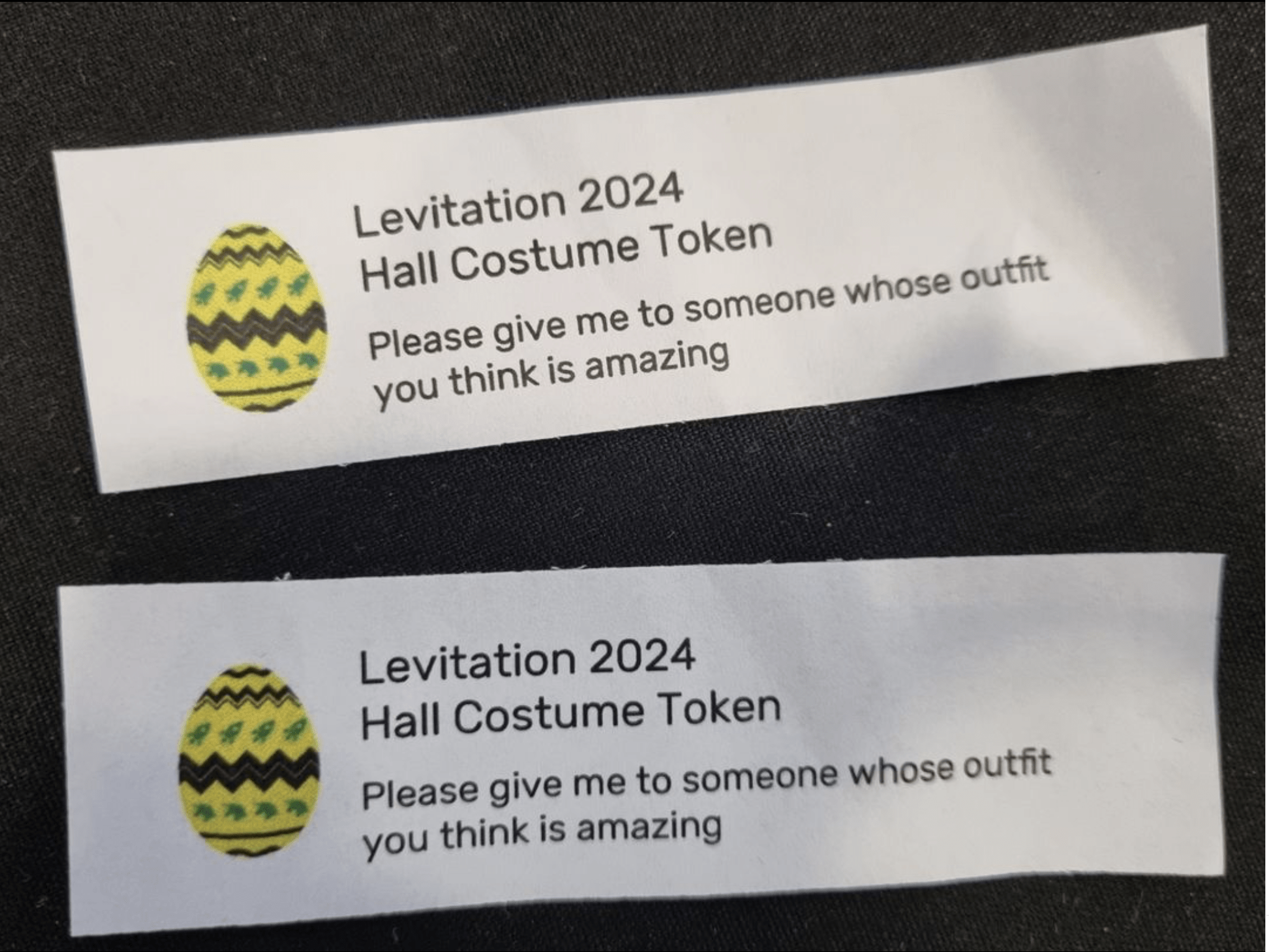
I Used To Be Unconventional: An Eastercon reflection
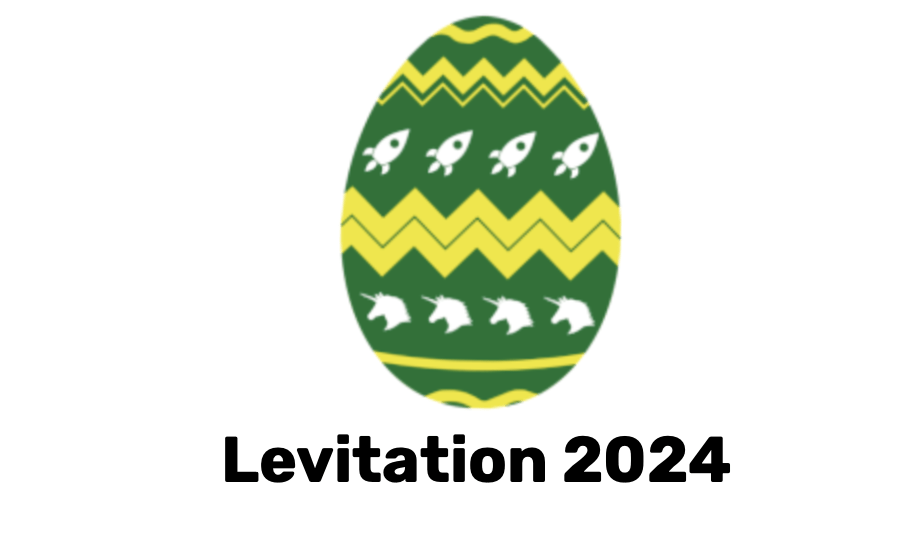
What did happen at Eastercon this year? Oliver Arditi reflects on his trip to Telford—and on the ‘con life in general.
In the future people will live in towns that don’t exist. All of their town-ness will be hidden away somewhere, and all you’ll be able to see if you drive or walk through them, even through the very centre, will be a lot of outskirts. Or at least, to this hick from rural Suffolk, that sounds pretty futuristic, but I guess that if you live in Telford, it’s probably standard. One of those central outskirts contains the Telford International Centre. I spent a weekend tramping back and forth between it and a holiday let in Telford’s one nice street, as it was the venue for Levitation, also known as Eastercon 2024, one of the British SFFH community’s major annual conventions.
I am not an old hand at conventions. This was my second outing, after my initiation at last year’s Fantasycon in Birmingham. Why I’ve waited until middle-middle-age, after a lifetime in love with fantasy and science fiction, and many years skirting around the idea of writing fiction, is a mystery to me (answers on a postcard please)—but I’ve not habitually been at all clubbable. I guess it took me this long to work out how great it would be for me, as a writer and a reader, to meet at least one other person who liked the same books that I do.
Turns out that cons are full of people like me. At Fantasycon last year I could tell that I had found my people, but for the most part I didn’t know them yet. The biggest difference for me at Levitation was that I knew a bunch of people already, and although I still don’t know any of them that well yet (at my age ‘know well’ means ‘have known for at least twenty years’), it was enough to make me feel like I was on home turf when I walked in. The best thing that happened all weekend was spending a couple of hours in the Holiday Inn bar with a bunch of welcoming, generous people, who I could tell (middle-age has also made me an excellent judge of character) will all be lovely, supportive friends if I make the effort to spend time with them.
“Deep, astute discussions”
As somebody who doesn’t know conventions, wandering the venue and attending a bunch of panels established some contrasts with my single point of comparison. We were rattling around a little in quite a big venue, but there were clearly a good few more people than at Fantasycon. The topics of the various talks and panels were also skewed somewhat away from the publishing business, and toward the creative side of making books, games, films, etc. I found some really deep, astute discussions of live political issues, such as ‘Climate Friction: Solarpunk and Environmental Justice’, as well as some with a lighter touch (‘what’s your favourite fictional example of…’), such as ‘What is the appeal of libraries for f/sf readers?’.
A highlight for me was the BSFA lecture, given by John Clute. Clute is one of this country’s leading scholars and critics of fantastika (as he likes to call our multifarious genres), and he’s one of my favourite writers.
I’ve never read his fiction, but many editions of classic fantasy and SF books that I own have introductions by him, and I get nearly as much pleasure from reading his paratexts as from the books themselves. I was too star-struck to go and tell him this, but his lecture (on the British Library’s appallingly destructive policy of discarding dust jackets) was a joy to hear.
(Image of John Clute from the United Agents website)
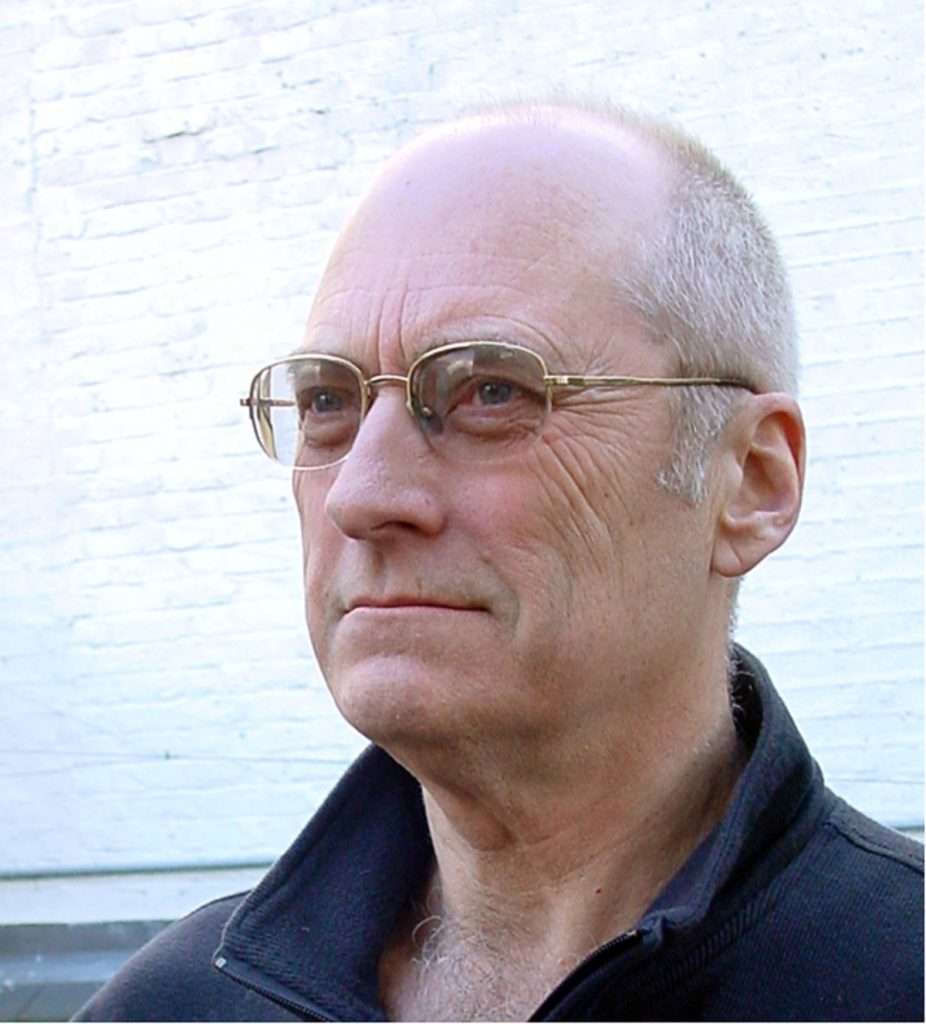
Eastercon is very aware of its own history and relationships, which is very important in my opinion. I’ve often reflected that institutions that discard their history as they progress, schools in particular, are hampering their own efforts to cohere as communities—that sense of continuity tells people that they are not simply part of a passing, temporary association, but of something substantial that they can hang on to, and that will remember them in turn. There was a display of historical BSFA publications and convention guides and so on in one corner of the art show. I have to say, there were quite a lot of eminences grises wandering the halls as well, which I see as a great positive. It’s of enormous value to bring multiple generations of fandom together in one place—people of different ages have a great deal to teach each other, in my experience. I spent a very rewarding half an hour in the bar talking to ‘Theodwyn’ (that’s Eowyn’s mum, if you’re not a Tolkien ultranerd like me), hearing her reminiscences of conventioneering from 1978 to the present day.
Oh, and that art exhibition. One of the guests of honour was Jackie Burns, an astronomical and aeronautic artist whose illustrations are frequently ‘fantastika adjacent’, and some of her work is stunning—she does a lot of illustrations in the style of the Ishihara colour vision test, with circles of colour of different sizes resolving to create an image that becomes harder to see the closer you get to it. She wasn’t the only brilliant artist on display, either: I can’t mention everybody, but I’d mention all of them if I could!
Cons transmit a community
More experienced con-ners introduced me to the 5-2-1 rule, which as I understand it (and practised it all weekend) means make sure you eat five meals a day, sleep for no more than two hours, and have at least one drink an hour. Sadly, I can only fantasise about that kind of schedule, as I’m still suffering from fatigue after a bout of Covid around four weeks ago—I had to husband my energies quite carefully (‘Mr. Scott, transfer all power from legs to facial recognition!’).
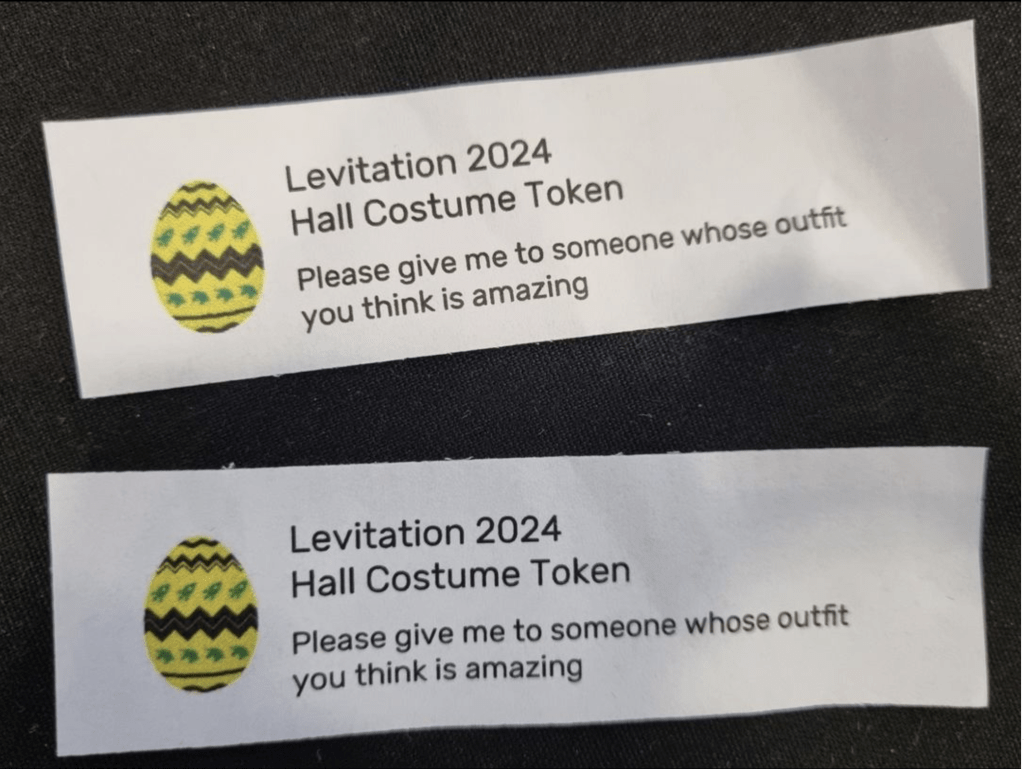
However, there is so much going on at an event like this that the cognitive load would be too much to go at it flat out, I think, even if I was fully fighting fit. As it was I spent a good few hours of each day in panels and talks, and managed a few viable social interactions as well.
(Pictured left, from the Eastercon Instagram page: community-building through complimenting costumes.)
There was a lot to like at Levitation, and a lot to learn. The most important thing about the whole event for me, however, was the way that it constitutes and transmits a community. This was on my mind going in, so I made sure to attend the opening ceremony, the Hugo nominations session (much excite for Glasgow Worldcon this August!), and the BSFA Awards. This time last year, I was a bit snotty about awards in general, but that’s because I had never witnessed the way that they function as a community celebration in this wonderful literary subculture that I am beginning to find my way into. It was worth the price of membership just to witness the joy, generosity, and mutual jubilation on display during the BSFA Awards ceremony.
I’m never too sure what the future will bring, and I’m just embarking on a career as a writer, so who knows where I’ll be this time next year? Published? Unpublished? Celebrated? Resentful? Famous? Drunk? What I do know, is where my people are at, and where I’ll be spending most of my Easters from now on.
Meet the author
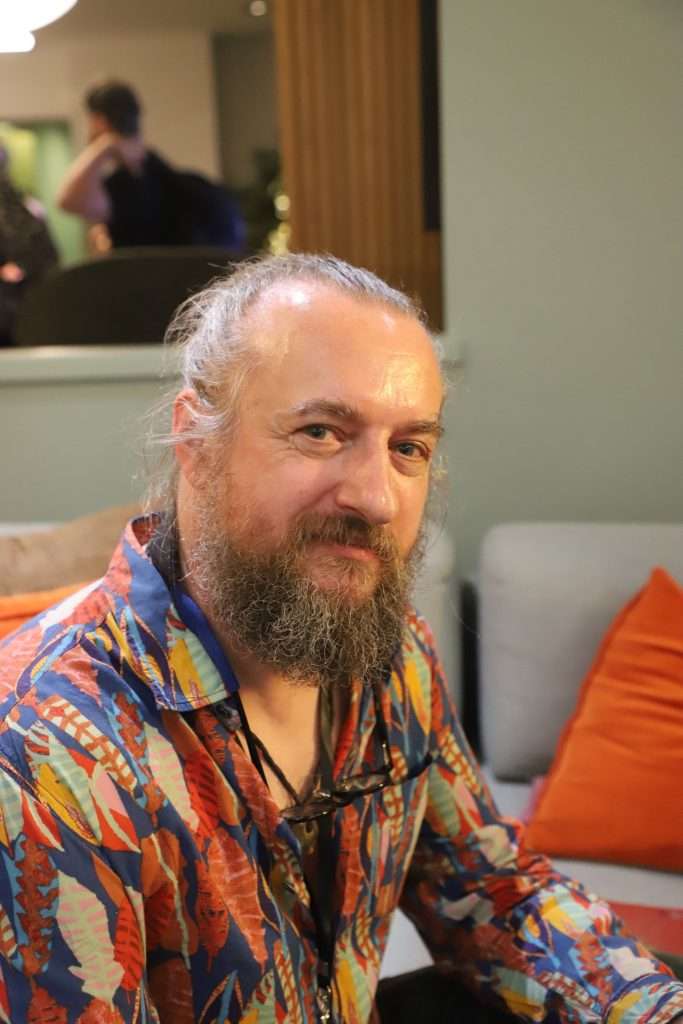
Oliver Arditi is a fantasy writer, with a particular interest in worldbuilding and constructed languages. He’s bringing a long-term project to fruition, and now has a complete draft of a novel set in the world he’s been building for several decades—all he has to do now is persuade someone to read it. He’s also trying his hand at short fiction, writes the occasional bit of non-fiction, and can be found online at oliverarditi.com.
He joined the BFS last year, and it was one of the best things he’s ever done.
Explore the blog:
Blog categories:
Latest Posts:
Tags:
#featured (56) #science fiction (25) Book Review (264) events (44) Fantasy (231) Graphic Novel (13) horror (136) Members (62) Orbit Books (48) profile (43) Romance (17) Science Fiction (50) short stories (28) Titan Books (52) TV Review (15)
All reviews
Latest Reviews:
- THE HOUSE ON THE BORDERLAND by William Hope Hodgson
- Monstrum by Lottie Mills
- Mood Swings by Dave Jeffery
- Yoke of Stars by R.B. Lemberg
- Hera by Jennifer Saint
- The Black Bird Oracle by Deborah Harkness
- RETURN OF THE DWARVES By Markus Heitz
- Delicious in Dungeon
- Toxxic by Jane Hennigan
- THIS ISLAND EARTH: 8 FEATURES FROM THE DRIVE-IN By Dale Bailey
Review tags:
#featured (2) Action (4) Adventure (4) Book Review (28) Fantasy (18) Featured (2) Feminist (2) Gothic Horror (3) Horror (14) Magic (3) Orbit Books (3) Romance (6) Science Fiction (5) Swords and Sorcery (2) Titan Books (7)
3 responses to “I Used To Be Unconventional: An Eastercon reflection”
Just a quick observation! Eastercon isn’t the BSFA’s convention, and hasn’t been since I’ve been going – the BSFA run events at Eastercon, but the two are separate.
Thanks for the clarification! I’ve made an edit to reflect that.
And to prove – perhaps – your point about Eastercon being aware of its own history, the last Eastercon directly organised by / responsible to the BSFA appears to have been in 1966.